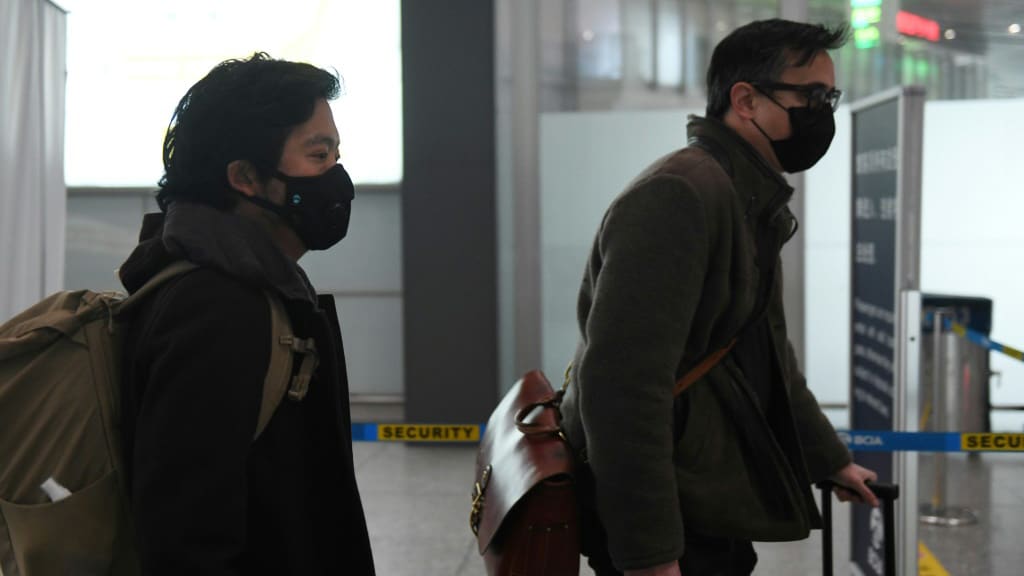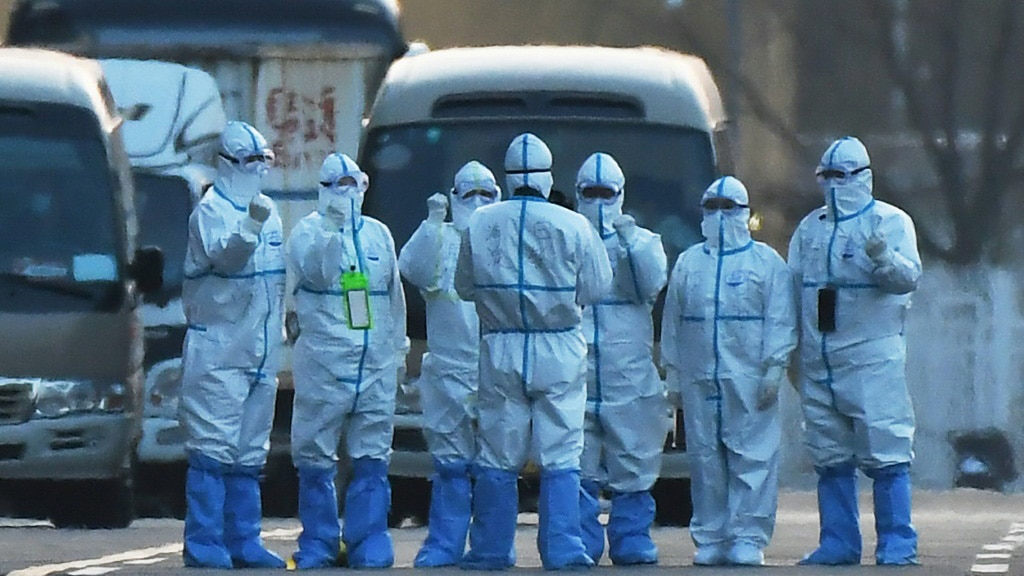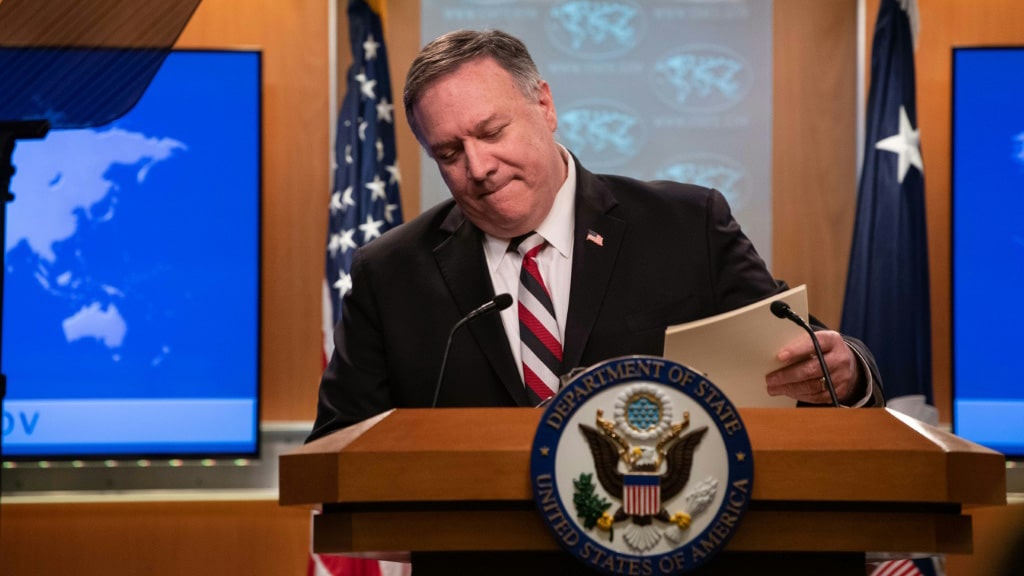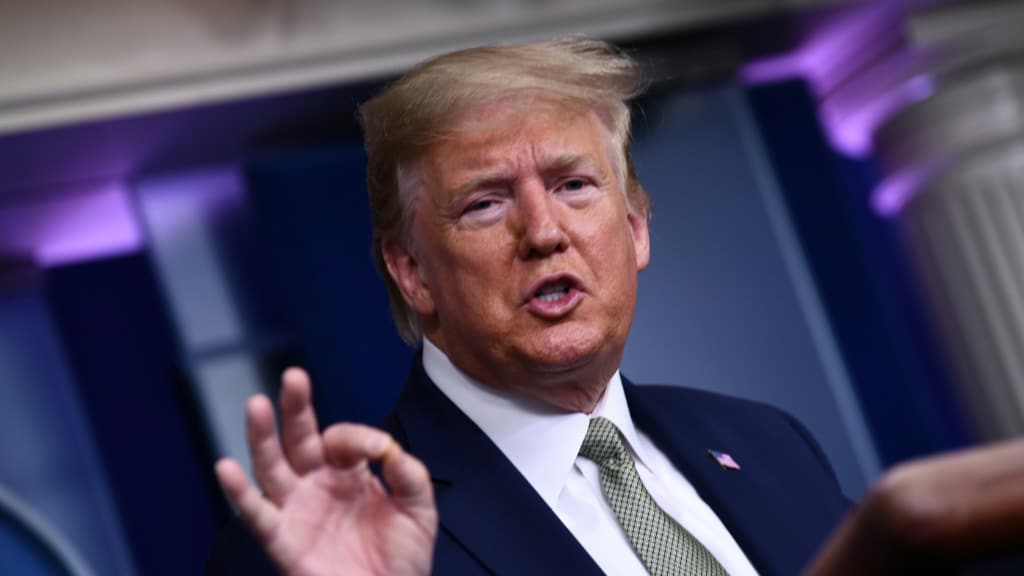China Expels US Journalists in Biggest Crackdown in Years

Wall Street Journal reporters Josh Chin (right) and Philip Wen walk through Beijing Capital Airport as they are expelled in February 2020 over a controversial headline in an op-ed in the newspaper
China on Wednesday expelled American journalists at The New York Times, The Washington Post and The Wall Street Journal in the Communist government’s most severe move against foreign media in recent memory.
The drastic move came as the two powers are feuding over the deadly coronavirus pandemic, with President Donald Trump provocatively branding it the “Chinese virus” and a senior official in Beijing promoting unfounded conspiracy theories of US involvement.
Beijing said it was retaliating for Washington’s decision to cut the number of Chinese nationals allowed to work for its state-run media on American soil.
The foreign ministry said that US journalists at the three newspapers, whose press cards were due to expire later this year, must notify the foreign ministry within four days starting Wednesday and hand back their credentials within 10 days.

Workers at a registration and screening center for processing people before transferring them to quarantine are pictured after loading travellers onto buses near Beijing Capital Airport
“They will not be allowed to continue working as journalists in the People’s Republic of China, including its Hong Kong and Macau Special Administrative Regions,” a statement said.
Beijing also ordered Voice of America, The New York Times, The Wall Street Journal, The Washington Post and Time magazine to declare in writing their staff, finances, operations and real estate in China — rules similar to those recently imposed on Chinese state media by Washington.
The foreign ministry said the measures “are entirely necessary and reciprocal” moves that China “is compelled to take in response to the unreasonable oppression the Chinese media organizations experience in the US.”
“They are legitimate and justified self-defense in every sense,” it said.

US Secretary of State Mike Pompeo leaves a press conference at the State Department
US Asks China to Reconsider
US Secretary of State Mike Pompeo said that China was wrong to equate state-run media, which answer to Beijing, and independent US news outlets that can freely report and ask critical questions.
“I regret China’s decision today to further foreclose the world’s ability to conduct the free press operations that, frankly, would be really good for the Chinese people in these incredibly challenging global times, where more information, more transparency are what will save lives,” Pompeo told reporters.
“This is unfortunate,” Pompeo said. “I hope they will reconsider.”
Dean Baquet, executive editor of The New York Times, condemned China’s move and voiced hope that Washington and Beijing would quickly resolve the dispute to let journalists keep working.
“The New York Times has been reporting on China since the 1850s, and we remain committed to covering the country, where we have more journalists than anywhere else outside the United States,” Baquet said.
“It is a grave mistake for China to move backwards and cut itself off from several of the world’s top news organizations.”
Both Baquet and Marty Baron, executive editor of The Washington Post, voiced concern that Beijing was expelling reporters in the midst of the coronavirus pandemic — in which Chinese authorities initially sought to suppress news.
“The Chinese government’s decision is particularly regrettable because it comes in the midst of an unprecedented global crisis, when clear and reliable information about the international response to Covid-19 is essential,” Baron said.

US President Donald Trump speaks during a daily press briefing on the coronavirus pandemic
Row Over Trump Language
The row nonetheless came as the coronavirus has divided the United States and China, with Trump and Pompeo repeatedly speaking of the “Chinese virus” or “Wuhan virus” — a reference to the metropolis where cases were first detected.
“It did come from China, so I think it’s very accurate,” Trump told reporters in defending his terminology.
Trump indicated that another motive was payback for what he said was China’s disinformation campaign.
“I didn’t appreciate the fact that China was saying that our military gave it to them. Our military did not give it to anybody,” Trump said.
The United States last week summoned the Chinese ambassador after a foreign ministry spokesman in Beijing, Zhao Lijian, tweeted a conspiracy theory that suggested that the US military brought the virus to Wuhan.
China is “strongly indignant” over Trump’s use of the term, which is “a kind of stigmatization,” foreign ministry spokesman Geng Shuang said earlier Tuesday.
The World Health Organization has also advised against geographic terms for illnesses, saying they can discourage people from seeking assistance.
China last month already expelled three other Wall Street Journal reporters — two Americans and one Australian — over what it deemed a racist headline by the US newspaper.
The headline, “China is the Real Sick Man of Asia”, was on an opinion piece that the three journalists were not involved in writing.
The expulsions had also been seen by some observers as a tit-for-tat move over the US decision to reclassify Chinese state-run media operating in the United States as foreign missions.
They were the first outright expulsions by China of a foreign journalist since 1998, according to the Foreign Correspondents’ Club of China.
by Laurent THOMET / with Shaun Tandon
